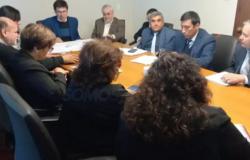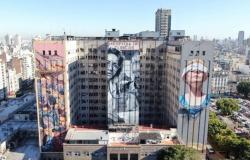The April numbers predict a aggravation of the situation: “We are worse than in March,” he says, and as his statements progress, this chronicler seems to be listening to the father, who was a candidate for President in the late ’90s and ambassador to Chile and Minister of Education of the Nation. . He looks like Pilo himself because of the almost identical tone of voice and inflections.. “It’s true,” Nacho Bordón smiles, “many have told me the same thing.”
Ignacio Bordón-Economist-Gastronomic.jpeg
Ignacio Bordón is one of the children of Pilo Bordón and Mónica González Gaviola. He is an economist and gastronomic entrepreneur who is a member of AEGHA. Photos: Martín Pravata
► YOU MAY BE INTERESTED: Count Patrick d’Aulan opened a sophisticated restaurant with a French air in his winery in Luján
Avatars of the gastronomic sector in times of high inflation
-Which people stopped going out to eat? Mendoza or foreigners?
– Both sectors, although not so much in terms of foreign clients. It used to be very cheap for Chileans to come to Argentina. It is still more convenient to eat here than in Chile, but not as much as before. The sharp drop is noticeable in local clientele and local tourism.
– Because?
– Because the salaries and real incomes of many have fallen greatly during the last year. Clearly it is an issue of disposable income and at this time gastronomy is an activity that is easier to cut back than others.
“When we see the macroeconomic numbers announced by the National Government, such as the drop in Gross Income and economic activity, they are lower compared to our sector, but not only in Mendoza but throughout the country” “When we see the macroeconomic numbers announced by the National Government, such as the drop in Gross Income and economic activity, they are lower compared to our sector, but not only in Mendoza but throughout the country”
– Added to this, I estimate, the rise in operating costs, which also complicates the sector…
– Yes, although we have not been able to transfer those costs to the final products. We have had very strong increases in food and beverages, our main cost, especially in December and January. There were increases of up to 70%, much more than last year. The increase in energy costs also hits us a lot. In my restaurants, last year, for example, the electricity bill was $450,000; today, average, $2.5 million to $3 million in March billing. And let’s wait for April… All of this, ultimately, reduces profitability for the gastronomic business.
Bordón, Ignacio. Economist-Gastronomic.jpeg
Ignacio Bordón, economist and gastronomic businessman, has a clear diagnosis of the sector in the midst of the crisis. Photos: Martín Pravata
Nacho Bordón, the economist
– What is your business history in gastronomy?
– I know the fast food industry first-hand because for many years I managed franchises in Argentina and Chile, but I have several own brand restaurants in Mendoza. Also, franchises in Buenos Aires.
“I am an economist: I come from the world of finance and I dedicated myself to investments until by chance in 2010 we bought a company that managed fast food in Chile and we brought the brand to the country and did the development. In 2018 I sold that company and in “In 2019 I returned to live in Mendoza” “I am an economist: I come from the world of finance and I dedicated myself to investments until by chance in 2010 we bought a company that managed fast food in Chile and we brought the brand to the country and did the development. In 2018 I sold that company and in “In 2019 I returned to live in Mendoza”
“In the post-pandemic I began to bring brands from Buenos Aires to Mendoza, such as Almacén de Pizzas and the Patagonia bars, among others” “In the post-pandemic I began to bring brands from Buenos Aires to Mendoza, such as Almacén de Pizzas and the Patagonia bars, among others”
-And political activity?
– No no. At AEGHA we have a lot of dealings with the Government but I never dedicated myself to politics.
– I ask the economist what view he has of the country’s situation, taking into account the data revealed by President Milei…
– These are essential changes due to the levels of inflation and fiscal deficit we had. Correcting the macroeconomy was a priority. Before the elections, from the business chamber we met with the candidates and their tourism teams and we all agreed that these variables had to be corrected: it is essential.
– Alfredo Cornejo, Vice President Hebe Casado and the Government have gone out to attract mining investments… Mining yes or no?
– If done in a careful manner with the environment and resources, mining in Mendoza is possible. In San Juan we have seen that. Mining generates direct and indirect benefits: good salaries, investments and services that impact the local economy. We know of the positive impact of mining activity. We must follow a very careful path of development so as not to harm other activities, such as tourism.
Ignacio Bordón-Gastronomic-Economist (2).jpeg

Ignacio Bordón received Diario UNO in his rest of the Arístides Villanueva.
Definitions in the midst of the crisis
“It was impossible to manage any business with the levels of inflation we had in Argentina, which impacted activity much more than we anticipated” “It was impossible to manage any business with the levels of inflation we had in Argentina, which impacted activity much more than we anticipated”
“We heard the President say that recovery is coming and we have expectations; however, in our sector we do not see immediate signs because salaries and tourism have a lot to do with our activity” “We heard the President say that recovery is coming and we have expectations; however, in our sector we do not see immediate signs because salaries and tourism have a lot to do with our activity”
“The backward exchange rate made Argentina very cheap for international tourism for many years. In Mendoza, private parties and the State did many things well – connectivity and infrastructure, among others – that must be promoted” “The backward exchange rate made Argentina very cheap for international tourism for many years. In Mendoza, private parties and the State did many things well – connectivity and infrastructure, among others – that must be promoted”
“We will have to get used to working with an exchange rate that may be less favorable for tourism but better for the country” “We will have to get used to working with an exchange rate that may be less favorable for tourism but better for the country”
► YOU MAY BE INTERESTED: Alejandro Vigil was re-elected president of Wines of Argentina for the second consecutive period








